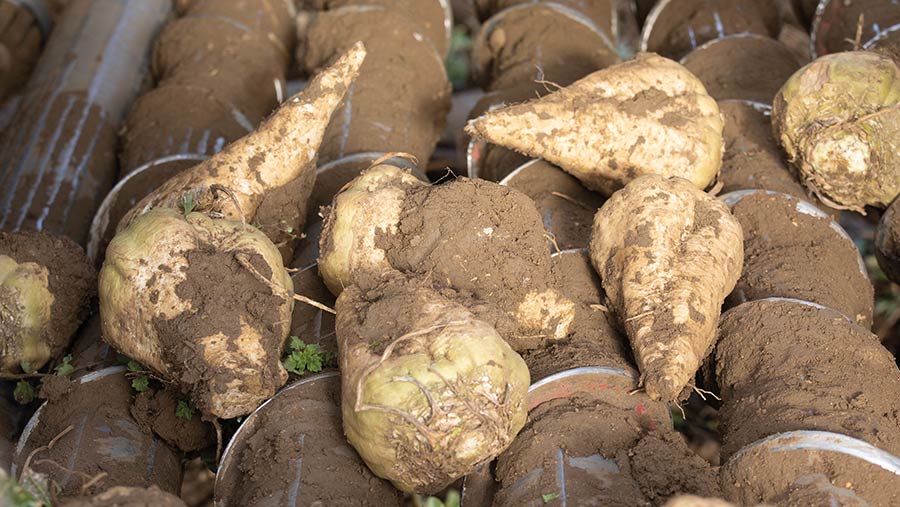How the new sugar beet contract shares virus yellows risk
 © Tim Scrivener
© Tim Scrivener Sugar beet growers are set to benefit from some brand new features contained in the 2021 contract, which resulted from negotiations between British Sugar and NFU Sugar.
Described as ground-breaking for including a new virus yellows yield-loss compensation scheme and a pilot futures-linked price contract, the more familiar one-year and three-year contracts consisting of a price per tonne and a market-linked bonus remain.
As before, the terms include the sugar-market-related bonus of 10% for the one-year contract and 25% for the three-year contract.
See also: What research is being done to tackle virus yellows in beet
While there has been virtually no price change from the 2020 contract, there are subtle differences in the form of a new sugar payment scale and the removal of crown tare deductions.
Together, these changes mean that beet growers will receive an increase on their contracts of 3.4% extra permanent tonnage.
There is also a revision to the late delivery bonus, which is now a single rate of 0.162% a day from 26 December, rather than bringing in a further increase in March.
Sugar beet contract 2021
- Prices – one year £20.30/adjusted tonne, three year £21.18/adjusted tonne
- Sugar market bonus of 10% (one year) and 25% (three year)
- Futures-linked variable price contract
- New virus yellows crop assurance scheme
- No-crown tare reduction
- New sugar payment scale
- Change to late delivery bonus
The potentially more valuable updates are evident in the virus yellows assurance fund and the futures-linked pilot contract, with growers and their advisers keen to understand more about how they will work in practice.
Both innovations come at a very challenging time for the crop – with weather extremes and very high aphid numbers creating difficulties throughout the 2020 growing season.
How the sugar beet contract will work
What are the terms?
- The one-year contracts will pay £20.30/adjusted tonne, up 70p from the 2020 contract price of £19.60/adjusted tonne. A market bonus of 10% is triggered when the adjusted EU reference price for white sugar exceeds €375/t (£339).
- The three year contracts will pay £21.18/adjusted tonne, which is a 73p increase from the 2020 contract. With this deal, the market bonus of 25% is triggered when the adjusted EU reference price exceeds €400/t (£362).
What has changed with crown tare?
Growers are now going to be paid for the entire root of beet they deliver, as the new prices are on a no-crown tare deduction basis.
That’s a change from previous years, when there was a deduction of 6.61% for crowns. As a result, all growers will get a yield increase.
Beet being delivered will still need to have green-leaf material removed and the dirt tare reduction remains.
What does the new sugar scale mean?
Contracts for 2021 onwards use a new sugar payment scale, which aims to pay for the sugar grown. In a low-sugar year, this will help, but where sugars are normally high, growers will be slightly worse off.
How will the virus yellows crop assurance scheme work?
A three-year £12m fund will compensate growers for a proportion of yield losses suffered where virus yellows is present in a crop, and covers both new and existing contracts.
Losses will start to be compensated where a grower delivers less than 90% of their contracted tonnage, providing certain conditions have been met.
Under the scheme, British Sugar will pay up to 45% of the loss, with the compensation being capped at a 35% yield loss.
What does the futures-linked contract offer?
Growers now have an option to choose a more flexible pricing mechanism for the beet they produce, providing at least 90% of the agreed tonnage remains in the existing pricing arrangement.
In the test year, just 100 growers will be able to allocate a maximum 10% of their tonnage onto this contract, giving them access to the sugar futures market for the first time.
This will allow them to decide when to price their beet and what level of risk they are prepared to accept.
Will sugar beet work for you?
Where you have the right infrastructure on the farm and are confident of achieving good yields, sugar beet continues to work very well, says Guy Bicknell of agricultural business consultant Wilson Wraight.
Opting for a one or three-year contract depends on the individual farm situation, but the market-led bonus means that the three-year deal has always outperformed the one-year option to date, he says.
“Having a mix of the two is usually a good move, as the one-year contract gives you some flexibility with your rotation.
“That’s even more relevant this year, following the weather extremes we’ve experienced and the political turmoil that continues to surround the farming industry.”
Not just margins
While sugar beet stacks up well when compared with other break crops on a gross margin basis, that’s only part of the picture when it comes to deciding whether to grow the crop or not, Mr Bicknell points out.
“Every farm is different and soil type will have a bearing. There are usually hidden costs associated with it, so things that should also be considered include harvesting and drilling contractor charges, yield losses in following crops and damage to soil structure.”
His figures (see table, below) suggest that yield is key – and he reminds growers that the costs associated with growing a high-yielding crop tend to be very similar to those of a low-yielding crop.
“The costs include all the variable costs, drilling, harvesting and casual labour and the figures are based on two thirds of the tonnage on a three-year contract and all the crop delivered before Christmas so no late delivery bonus,” he says.
Mr Bicknell accepts that the old arguments for growing sugar beet remain – it’s a good spring break crop which spreads workloads and can be part of a blackgrass control strategy.

© Tim Scrivener
Three crop rule
“What has changed this year is that feed wheat prices have risen, while the three-crop rule no longer applies. So it’s the right time to think about why you are growing sugar beet and review your costs of production,” says Mr Bicknell.
Also consider that sugar beet is a crop that needs attention to detail, or else it struggles to perform better than other break crops, he stresses.
“It’s good for soil structure right up until the harvester arrives. If you’re a heavy land farm and the only lifting option is December or January, you may find that the damage done to your asset will outweigh the benefits.”
Effect of yield on the return from sugar beet |
||
| Yield | 80t/ha | 65t/ha |
| Costs | £940/ha | £940/ha |
| Margin | £731/ha | £418/ha |
Virus yellows
Virus yellows is caused by a complex of viral agents, including beet mild yellowing virus, beet yellows virus and beet chlorosis virus.
Unchecked, yield losses from virus yellows are estimated to be in the region of 20-25%, with the UK’s maritime climate proving to be ideal for the aphids, which transmit the virus by feeding on the plants.
Losses are greatest in years when aphids colonise beet plants early in the spring and multiply rapidly.
Until now, widespread use of neonicotinoid seed treatments has provided excellent aphid control during the early stages of crop growth, protecting the crop against virus yellows and its associated yield loss.

